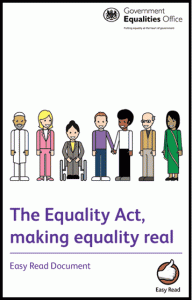"The Equality Act 2010 is the law which bans unfair treatment and helps achieve equal opportunities in the workplace and in wider society"
- Home Office
 The Equality Act received Royal Assent on 8 April 2010, just before the General Election, and the implementation of the majority of the Act began on 1 October 2010. The Act brings together the nine protected characteristics of: age, disability, gender reassignment (with a wider definition), marriage and civil partnership, pregnancy and maternity, race, religion or belief, sex and sexual orientation.
The Equality Act received Royal Assent on 8 April 2010, just before the General Election, and the implementation of the majority of the Act began on 1 October 2010. The Act brings together the nine protected characteristics of: age, disability, gender reassignment (with a wider definition), marriage and civil partnership, pregnancy and maternity, race, religion or belief, sex and sexual orientation.
As part of the Act, the Gender Equality Duty (GED), along with the Race and Disability Equality Duties has been replaced by a Single Public Sector Equality Duty (PSED). This also covers all the protected grounds mentioned above. The Duty came into force in England and in Scotland from April 6 2011, and in Wales in Summer 2011. WRC will be following the development of the PSED closely as we are concerned that the specific duties contained within the GED have been altered and potentially impact on its effectiveness as a tool to hold public bodies to account.[/
 Read WRC's briefings on the Equality Act:
Read WRC's briefings on the Equality Act:
March 2012:
Equality Act briefing March 2012
Public Sector Equality Duty briefing for women's organisations
March 2011:
Updated WRC briefing: Equality Act
November 2010:
WRC briefing: Equality Act 2010
 WRC have also produced two template letters that can be used to highlight the obligations of public bodies in terms of women's rights under the Equality Act.
WRC have also produced two template letters that can be used to highlight the obligations of public bodies in terms of women's rights under the Equality Act.
Draft letter to public bodies asking how they are complying with duties under the Equality Act
Draft letter promoting women-only services to local councils
Please feel free to use these to contact your local authority and be sure to include further relevant information about your work and the women you work with. Just sending these letters is a chance to build relationships with decision-makers and to ensure that women's voices are heard at a local level.
When public bodies carry out their functions and make decisions, they have to do so in accordance with the law. There are a variety of legal principles which they have to follow, and a failure to do so renders many decisions or even action or inaction potentially unlawful.
Judicial review is a process by which the courts review the lawfulness of a decision made or action taken by a public body. It is a mechanism by which a judge considers whether a public body has acted in accordance with its legal obligations and if not, whether to take steps to undermine it.
If you think the Public Sector Equality Duty is not being followed you can ask a judge to examine the decision using judicial review if there is no suitable alternative remedy.
If you want to know more about Judicial review, Leigh Day, a specialist law firm, has put together a useful introductory leaflet on Judicial Review, which you can read here.
